Intro
Discover 5 potassium rich foods, including bananas, spinach, and avocados, to boost your intake of this essential mineral, supporting healthy blood pressure, muscle function, and bone health, with these nutritious and delicious dietary additions.
Potassium is an essential mineral that plays a crucial role in maintaining various bodily functions, including heart health, blood pressure, and muscle function. Despite its importance, many individuals fail to consume sufficient amounts of potassium in their diets. The recommended daily intake of potassium is 4,700 milligrams per day, but the average person consumes only about 2,600 milligrams. This deficiency can lead to a range of health problems, including fatigue, weakness, and heart arrhythmias. Fortunately, there are many potassium-rich foods that can help individuals meet their daily needs.
A well-balanced diet that includes a variety of whole foods can provide adequate amounts of potassium. Foods that are rich in potassium include fruits, vegetables, whole grains, lean proteins, and low-fat dairy products. Some of the richest sources of potassium include leafy greens, such as spinach and kale, as well as fruits like bananas and avocados. Nuts and seeds, like almonds and pumpkin seeds, are also good sources of potassium. By incorporating these foods into their diets, individuals can help ensure they are getting enough potassium to maintain optimal health.
In addition to its role in maintaining overall health, potassium has also been shown to have numerous benefits for specific health conditions. For example, potassium can help lower blood pressure, reduce the risk of heart disease, and alleviate symptoms of menopause. It can also help regulate fluid balance, promote healthy bone density, and support muscle function. With so many benefits, it's no wonder that potassium-rich foods are considered some of the healthiest options available. By learning more about these foods and how to incorporate them into their diets, individuals can take a proactive approach to maintaining their health and well-being.
Potassium Rich Foods
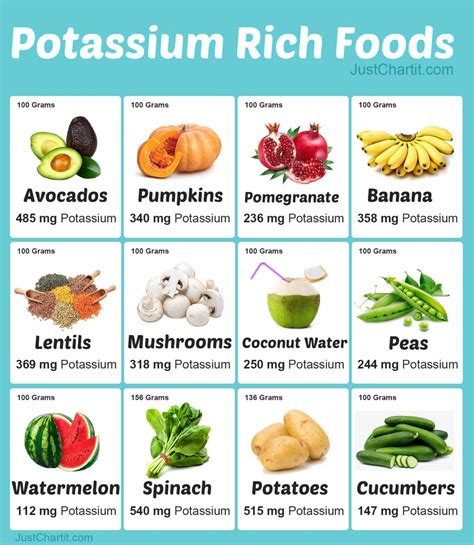
Some of the top potassium-rich foods include sweet potatoes, which contain 542 milligrams per medium-sized potato. Other good sources include white beans, such as cannellini or Great Northern beans, which contain 1,013 milligrams per 1/2 cup. Leafy greens like spinach and kale are also rich in potassium, with 840 milligrams per 1 cup cooked. Fatty fish like salmon and tuna are good sources as well, with 534 milligrams per 3-ounce serving. Avocados are another potassium-rich food, with 708 milligrams per medium-sized fruit.
Benefits of Potassium Rich Foods
The benefits of potassium-rich foods are numerous and well-documented. Some of the key benefits include: * Lower blood pressure: Potassium can help lower blood pressure by balancing out the effects of sodium and promoting healthy blood vessel function. * Reduced risk of heart disease: Potassium can help reduce the risk of heart disease by lowering blood pressure, reducing inflammation, and promoting healthy blood lipid profiles. * Alleviated symptoms of menopause: Potassium can help alleviate symptoms of menopause, such as hot flashes and night sweats, by promoting healthy hormone balance and reducing inflammation. * Regulated fluid balance: Potassium can help regulate fluid balance in the body, which can help reduce the risk of conditions like edema and kidney stones. * Promoted healthy bone density: Potassium can help promote healthy bone density by reducing the excretion of calcium in the urine and promoting the formation of new bone tissue.Top 5 Potassium Rich Foods
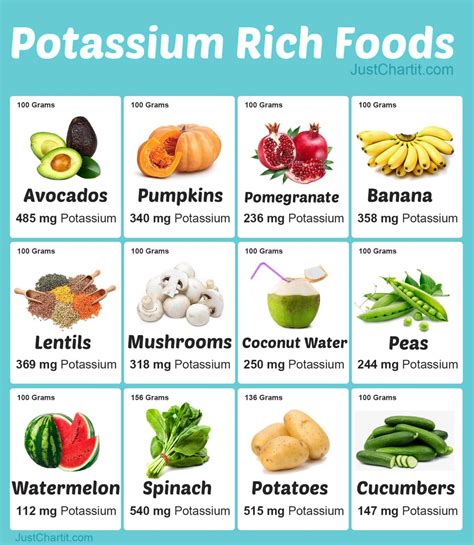
The top 5 potassium-rich foods are:
- White beans: 1,013 milligrams per 1/2 cup
- Leafy greens: 840 milligrams per 1 cup cooked
- Sweet potatoes: 542 milligrams per medium-sized potato
- Avocados: 708 milligrams per medium-sized fruit
- Fatty fish: 534 milligrams per 3-ounce serving
How to Incorporate Potassium Rich Foods into Your Diet
Incorporating potassium-rich foods into your diet can be easy and delicious. Some tips for getting more potassium include: * Eat a variety of fruits and vegetables: Fruits and vegetables are some of the richest sources of potassium, so aim to include a variety in your diet. * Incorporate leafy greens into your meals: Leafy greens like spinach and kale are rich in potassium, so try adding them to salads, smoothies, and sautéed dishes. * Snack on nuts and seeds: Nuts and seeds like almonds and pumpkin seeds are good sources of potassium, so keep them on hand for a quick snack. * Try new recipes: There are many delicious recipes that feature potassium-rich foods, so try experimenting with new dishes to find ones you enjoy.Potassium Deficiency

A potassium deficiency can occur when the body does not have enough potassium to function properly. This can happen for a variety of reasons, including:
- Inadequate diet: If an individual is not consuming enough potassium-rich foods, they may develop a deficiency.
- Excessive sweating: Excessive sweating can lead to a loss of potassium, which can cause a deficiency if not replenished.
- Certain medications: Certain medications, such as diuretics, can cause the body to lose potassium.
- Underlying medical conditions: Certain medical conditions, such as kidney disease, can increase the risk of a potassium deficiency.
Symptoms of Potassium Deficiency
The symptoms of a potassium deficiency can vary depending on the severity of the deficiency. Some common symptoms include: * Fatigue and weakness * Muscle cramps and spasms * Abnormal heart rhythms * Constipation * Bloating and water retentionFood Sources of Potassium
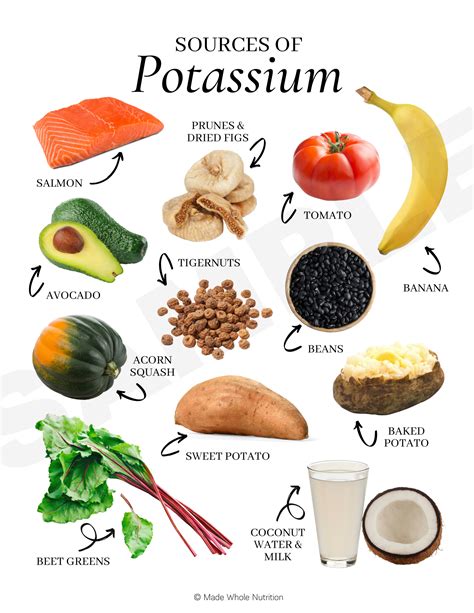
There are many food sources of potassium, including:
- Fruits: bananas, avocados, apricots, citrus fruits
- Vegetables: leafy greens, sweet potatoes, carrots, squash
- Whole grains: brown rice, quinoa, whole wheat bread
- Lean proteins: fatty fish, chicken, turkey
- Low-fat dairy: milk, yogurt, cheese
How to Choose the Best Potassium Rich Foods
When choosing potassium-rich foods, there are several factors to consider. Some tips include: * Choose whole foods: Whole foods are generally richer in potassium than processed foods. * Variety is key: Eating a variety of foods can help ensure you are getting enough potassium. * Consider the serving size: Be sure to check the serving size of the food to ensure you are getting enough potassium. * Check the nutrition label: If you are unsure about the potassium content of a food, check the nutrition label.Potassium and Blood Pressure
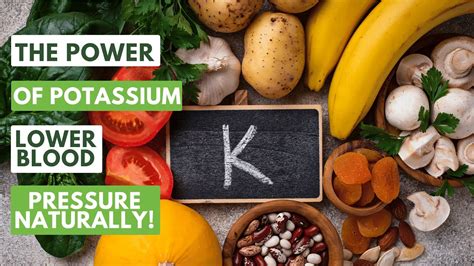
Potassium can help lower blood pressure by balancing out the effects of sodium and promoting healthy blood vessel function. Some ways potassium can help with blood pressure include:
- Reducing sodium's effects: Potassium can help reduce the effects of sodium in the body, which can help lower blood pressure.
- Promoting healthy blood vessel function: Potassium can help promote healthy blood vessel function, which can help reduce blood pressure.
- Reducing inflammation: Potassium can help reduce inflammation, which can help lower blood pressure.
How to Use Potassium to Lower Blood Pressure
Using potassium to lower blood pressure can be easy and effective. Some tips include: * Increase potassium intake: Increasing potassium intake can help lower blood pressure. * Reduce sodium intake: Reducing sodium intake can help potassium work more effectively. * Eat a balanced diet: Eating a balanced diet that includes a variety of whole foods can help ensure you are getting enough potassium. * Consider supplements: If you are unable to get enough potassium from food sources, consider taking a supplement.Potassium and Heart Health
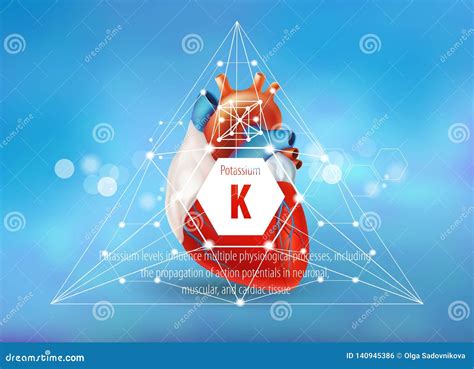
Potassium can help promote heart health by reducing the risk of heart disease and promoting healthy blood lipid profiles. Some ways potassium can help with heart health include:
- Reducing blood pressure: Potassium can help lower blood pressure, which can reduce the risk of heart disease.
- Promoting healthy blood lipid profiles: Potassium can help promote healthy blood lipid profiles, which can reduce the risk of heart disease.
- Reducing inflammation: Potassium can help reduce inflammation, which can reduce the risk of heart disease.
How to Use Potassium to Promote Heart Health
Using potassium to promote heart health can be easy and effective. Some tips include: * Increase potassium intake: Increasing potassium intake can help promote heart health. * Eat a balanced diet: Eating a balanced diet that includes a variety of whole foods can help ensure you are getting enough potassium. * Reduce sodium intake: Reducing sodium intake can help potassium work more effectively. * Consider supplements: If you are unable to get enough potassium from food sources, consider taking a supplement.What are the symptoms of a potassium deficiency?
+The symptoms of a potassium deficiency can include fatigue and weakness, muscle cramps and spasms, abnormal heart rhythms, constipation, and bloating and water retention.
How can I increase my potassium intake?
+You can increase your potassium intake by eating a variety of whole foods, including fruits, vegetables, whole grains, lean proteins, and low-fat dairy products. You can also consider taking a supplement if you are unable to get enough potassium from food sources.
What are the benefits of potassium-rich foods?
+Potassium-rich foods can help lower blood pressure, reduce the risk of heart disease, alleviate symptoms of menopause, regulate fluid balance, and promote healthy bone density.
In conclusion, potassium is an essential mineral that plays a crucial role in maintaining various bodily functions. By incorporating potassium-rich foods into their diets, individuals can help ensure they are getting enough potassium to maintain optimal health. With its numerous benefits, including lower blood pressure, reduced risk of heart disease, and alleviated symptoms of menopause, potassium-rich foods are a great addition to any diet. By learning more about these foods and how to incorporate them into their diets, individuals can take a proactive approach to maintaining their health and well-being. We encourage you to comment below with your favorite potassium-rich foods and share this article with others who may benefit from learning about the importance of potassium.
